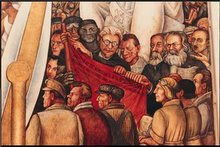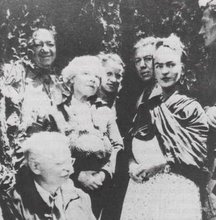Dear readers
There is three other sections which I will write but
due to other committments the rest will not be written
for at least several weeks, if not months. I decided to
publish what I have already written to open up a
discussion.
HOW MARXIST CONCEPTS OF LAW AND UNEVEN AND COMBINED DEVELOPMENT AND DIALECTICAL MATERIALISM ARE CRUCIAL TO UNDERSTAND INTERNATIONAL EVENTS AND HISTORY.
Due to the break of many forces with Trotskyism the theoretical level of most left forces have gone backwards relapsing into adapting to anti-Trotskyist ideas. Trotsky remarked during the 1920s in a worse crisis when Social Democracy degenerated after 1914 that even outstanding intellectuals such as Kautsky went backwards. The only way forward for Trotskyism is to reclaim its old ideas and apply them.
1. MARX AND ENGELS’S CONTRIBUTION TO SCIENCE OF HISTORY: HISTORICAL MATERIALISM AND DIALECTICAL INTER-RELATIONSHIP BETWEEN DIFFERENT SCIENCES.
Marx and Engels developed the most advanced science of History by applying of what they called the Historical Materialist method. One very important theoretical breakthrough of Engels was that distinguished humans from other animals qualitatively were the use of labour as main means of our survival.
This key work is in “Transition from Ape to Human”. That represented the beginning of social as separate from Cosmology and Biology although each is subordinate to the other when it comes to the last analysis and are dialectically inter-related. As Trotsky said in his work “In Defence of Marxism” that dialectically lower developments develop into qualitatively higher ones. Cosmology in the last analysis affects all life on Earth as shown through Asteroids and weather patterns from the inner and outer cores and atmospheres of this planet. Biology has a big influence on humans through diseases and inter-reacts with other living creatures. Societies through its different modes of production influences nature as shown by global warming through Capitalism. Trotsky made the key point without the laws of space and nature developing dialectically with the ebb and flow of rapid advances and problems due to proceeding through contradictions Humanity would never have arisen.
Marx and Engels with the development of Anthropology modified their analysis that all of Human history was the laws of class struggle because they learnt about discoveries of remnants of Primitive Communism in remote islands. They explained how the transition was made from scarcity of these societies to class ones made possible by agricultural surpluses. It took centuries and decades for Slavery to establish itself by enslaving Slaves and protecting their property by disarming the masses and establishing a separate armed state apparatus protecting their rule. This was due to mass resistance which eventually over that time span was finally defeated.
Marx argued that class society was historically progressive in allowing specialists separate from subsistence production due to Sciences being able to emerge. He argued that each form of class society has different economic laws which characterise how they are run. The key point he made is that is these economic laws which determines which what property relations a particular state defends. Within this framework there can be political regimes which can politically expropriate the ruling class but defend that class’s rule in their own way.
This understanding enabled Trotsky to analyse the peculiarities of Fascism and Stalinism. Fascism as Trotsky explained in the “Revolution Betrayed” despite politically expropriating the Bourgeoisie has very close contacts with the ruling Capitalist class and subordinates those Aristocrats to German Capitalism. Trotsky argued what was unique about Stalinism was that a Bureaucratic caste had so much power due to arising out of a heavily improvised working class.
The dialectical paradox as pointed out by Trotsky was that the workers had better gains within the Soviet Union than under Capitalism but suffered harsh and brutal conditions. He argued this Bureaucracy emerged due to Imperialist encirclement of that country; the defeat of several revolutions and upheavals worldwide; and those Bureaucrats who were Scientists and technicians had a massive advantage due to lack of education among the workers. There is a mistake by some on the American left who use the wrong formula that Imperialism directly created Stalinism. The fallacy of this theory as Trotsky correctly pointed out in the “Revolution Betrayed” is that if Imperialism had this power they would have restored Capitalism in Russia. In my opinion the best way to explain this process is that Imperialism indirectly caused Stalinism’s rise through its encirclement and since 1989 has taken advantage of certain Bureaucratic layers to seriously attempt a return to Capitalism in Eastern Europe; Russia; and other ex-Soviet states.
2. SOCIAL REVOLUTIONS AND ATTEMPTED SOCIAL COUNTER-REVOLUTIONS AND LAW OF UNEVEN AND COMBINED DEVELOPMENT.
Social systems can be destroyed through a combination of revolutions and wars. The first historic example is proto-Feudal forces destroying the Roman Empire during 5th Century AD. That Empire was based on Slavery. Due to being defeated in war the Aristocracy filled the vacuum in Western Europe with a Feudal system emerging out of that collapse of Slavery. In Eastern Europe due to the Byzantine Empire officially called “Eastern Roman Empire” kept Slavery right through to Medieval times. This is how they carried on the traditions of the Roman Empire.
Capitalism in Holland; England; and France overthrow Feudalism through war; and at least through revolution (England and France) which led to mass mobilisations. There are important lessons how Bourgeois forces for two to three centuries in those countries manoeuvred with Liberal Aristocratic factions to gain concessions which strengthened them. This laid the basis for the Bourgeois revolutions. They were compelled to mobilise mainly petty-bourgeois forces because the main Aristocratic faction would not surrender their rule.
Prior to the 1642 direct conflict between Cromwell and Charles I there were violent disturbances in London by layers of the masses. The main conflict however was between the Bourgeois Parliament in alliance with Liberal Aristocratic factions against an outright Feudal monarchy which erupted into civil war. As the civil war battles were inconclusive Cromwell was forced to mobilise lower classes in order to win that war. In order to incorporate these layers the New Model Army was formed.
In 1789 the French Revolution was a turning point in European and world history. Trotsky quotes Robespierre in “History of the Russian Revolution” his famous statement that the nobility had undermined the Bourbon monarchy, which in turn encouraged Bourgeois elements to challenge Feudalism, resulting in a revolutionary uprising on 14th July 1789 in Paris beginning with the Bastille storming. Robespierre believed that the European ruling classes would learn from this experience and not precipitate a pre-revolutionary crisis again. Trotsky argued that was true with the ruling classes only splitting again publicly when an actual revolutionary upheaval breaks out. In 1848 when Bourgeois elements in the German states compromised with Aristocratic forces fearing mobilising the workers, Marx started formulating the theory and strategy of Permanent Revolution out of this experience. Trotsky developed a similar method after the defeat of 1905’s revolution in Russia.
There is an analogy between the Bourgeois revolutions against Feudalism and the manoeuvring of Imperialism to support certain Bureaucratic factions in Russia and Eastern Europe who they hoped would help the transition to Capitalism. The historical context is different. When they overthrew Feudalism Capitalism was progressive in developing the productive forces but when they are attempting to overthrow the Workers’ States it is completely reactionary as it would destroy considerable gains in these societies’ productive forces. Another distinction was that Capitalism succeeded in Western Europe against Feudalism because it represented the next progressive stage whereas both the workers and most Bureaucrats are resisting the moves back to Capitalism because their past gains (and most Bureaucrats privileges are threatened.
3. MARXISM LEARNS FROM PARTIAL HISTORIES AND EXPERIENCES OF STRUGGLE BY THE EXPLOITED AND OPPRESSED.
Trotsky in his many writings said that Marxism is the conscious expression of objective processes of fighting to remove the last class society: Capitalism. Even among historians of class society number 1: Slavery had to do accurate analysis of what kind of societies Ancient Greece had to deal with in terms of obtaining Slaves and through trade. Herodotus’s writings on the equality and central role of women in warfare within the Sauromatian population located in southern-eastern Crimea are a very good example of this.
The Sauromatians were descended from the Samaritans who come from ancient Persia (today Iran). After losing a battle with the Greeks at Pontus (northern Turkey) which meant they were enslaved. They rebelled and threw their captors overboard on ships which ended up in Scythia which was the land of that part of Crimea previously mentioned. Those Sauromatians forced Scythian men to become nomads like themselves and for Scythian women to have the same rights as they had. This is an example of Primitive Communism being a feature of ancient nomads.
Another example of useful history was the French Aristocratic women demanding more rights in late Medieval France by writing a series of works on womens’ history was the beginning of French Feminism. This is why mobilising oppressed women was key to the Bourgeois revolution in 1789. That is why the Jacobin party had a programme for women. The Renaissance and Enlightenment which was crucial in laying the basis for Capitalism all Sciences developed massively.
George Novack argued the biggest highpoint of that process of Enlightenment was the development of Marx which combined all the Natural Sciences; acceptance of Hegel’s Dialectics (whilst opposing Hegel’s Idealist version); and incorporated Feurbach’s Materialism on religion at the same time rejecting Feurbach’s mechanistic version. Novack pointed out in his work “Logic of Marxism” that Marx fused both Hegel and Feurbach but also rejecting their defects, developing the new method of Dialectical Materialism.
All the struggles by workers and oppressed layers are coming to the surface which is not accident. It is an anticipation of the struggles developing in embryo due to Capitalism needing to attack workers and petty-bourgeois elements, combined with scapegoats to take attention from the real causes of social misery: which is the crisis-ridden Capitalist system.
4. MARY SCULLY IS CORRECT ABOUT BOLSHEVISM’S LEGACY BUT WRONG TO ARGUE THAT ASPECTS OF LENIN’S THEORY ON IMPERIALISM IS OUTMODED.
Mary Scully has written a useful article (it is available on Socialist Action on News and Views) showing the link between Russia’s October 1917 Revolution and how it influenced colonial revolutions. She contrasts this with the Social Democratic betrayals on Imperialism, and social oppression. One important point she makes is that the betrayal of Germany’s 1918 revolution strengthened Imperialism laying the basis for World War 2. The Bolshevik literature including Trotsky’s theory of Permanent Revolution links the struggle for workers power linked up to fights against social oppression within Imperialist countries; and the link between Permanent Revolution in colonies/semi-colonies; and Socialist Revolutions in those Imperialist countries. It is important with the world Capitalist economic crisis that this tradition is carried to the workers; youth; and oppressed. This is beginning with the theoretical resurgence of Marxism, especially Trotsky among the youth worldwide.
Scully is correct when she says that there are more possibilities of Socialist Revolutions within Imperialist countries due to necessity of Capital to remove workers’ past gains. She makes a major error implying that Lenin never saw this reality. After 1914 Lenin argued Capitalism had finished its historically progressive role by reaching a stage of Imperialist decay.
Capital within the Imperialist countries could only stop profits falling by cutting out their rivals’ profits and attacking their own workers. This is why he called the epoch as one of Imperialist war; attempted counter-revolutions; and World Socialist revolution. Scully also makes a mistake that the Iraq war represents a new qualitative development of Imperialism which Lenin according to her Lenin never foresaw.
In fact what the Afghan and Iraq war represent is that there is a tendency due to Capitalist crisis to go back to more to Imperialist forms of open Colonialism. Imperialism’s aims are to overthrow the Workers’ States and totally dominate the semi-colonies. This raises the danger of World War 3 as the Russian Bureaucracy will not tolerate total Imperialist hegemony which would threaten their rule.
Trotskyists have recognised this tendency after World War 2 but as the American SWP argued against Pablo the expansion of Workers’ States and the Colonial revolution weakened their ability to do this. Imperialism’s offensive after 1989 has raised the danger of such a World War but with the setbacks in Afghanistan and Iraq and the recovery of the Russian Workers’ State this danger has been weakened. Mass consciousness lags behind objective reality, Trotsky argued.
There was some nervousness by the masses when NATO bombed Yugoslavia in 1999 that this could lead to a World War but believed that Clinton would make a deal with the Russian Bureaucracy to lessen that danger. After September 11th 2001 the American and world masses realised the danger due to the neo-Cons overplaying their hand. Now that the masses have awoken to this danger there is going to be massive struggles against such an outcome which the world anti-Iraq war movement shows. It is one of the factors that are causing a massive youth radicalisation within America. Another adventure by Imperialism against the Serbs with the danger of provoking the Russian Bureaucracy could cause a pre-revolutionary crisis in America. If such an eventuality happens it could as Trotsky said in 1929 lift the entire world onto a new plain.
5. MARY-ALICE WATERS DUE TO FEAR OF BARNESITE CLIQUE OF GROWING RADIACALISATION WHICH COULD SEE RE-EMERGENCE OF AUTHENTHIC TROTSKYISM WHICH COULD DESTROY THEIR INFLUENCE IS TRYING TO WALL U.S. SWP MEMBERSHIP AWAY FROM INFLUENCES OF THIS OBJECTIVE PROCESS BY DRAWING MOST PESSIMISTIC CONCLUSIONS FROM CAPITALIST CRISIS.
Jack Barnes and his supporters broke from the Trotskyist tradition of the American SWP in a get-rich-quick scheme of building a mass Castroist international. During the early-to-mid 1980s the Barnesites capitulated to their programmatic weaknesses by rejecting Permanent Revolution and
Political Revolutions within the Degenerated Workers’ States. Barnes predicted at the 1982 YSA convention that by end of that decade Trotsky would be forgotten historically. This was another example of his impressionism but became qualitative in rejecting Trotskyism.
Contrary to Barnesite impressionism Stalinism in 1989 was challenged by the masses. The Barnesites pulled back from their adaptation to Stalinism by correcting supporting those revolutionary upheavals. They (Barnesites) managed to get away with freezing their politics by promoting Trotsky against Stalinism, whilst opposing his central theory of Permanent Revolution. By Trotskyism being marginalised by the Liberal Bourgeois ideological offensive within the Imperialist countries they managed to get away with this compromise.
There are certain aspects of Trotskyism which the SWP holds such as opposing the LCR CC majority supporting Chirac in a Popular Front supposedly to defeat Le Pen; supporting the Red Terror during the 1918-1921 Russian civil war against revisionists; the centrality of Afro-American struggle; defending Engels on origins of Womens oppression; and still recognising Eastern Europe and Russia as Workers’ States.
Despite this their Achilles hill is the growth of Permanent Revolution theory epitomised by Chavez and their wrong analysis of post-9/11 developments which they wrongly characterise being of total American Imperialist supremacy. This opportunism in opposing the Iraqi resistance flows from fear they cannot defend the totality of their politics from opponents. They are trying to create barriers so the membership is not influenced by the growth of Trotskyism. The Barnesites still lack confidence despite the fact that most ex-Trotskyists are even worse with them dumping defence of Eastern European and Russian Workers’ States.
The Barnesites room for manoeuvre is narrowing. Authentic Trotskyism is beginning to rise due to the Capitalist and Stalinist crisis which has the potential to sweep the world and smash anything that stands in its way. In the past few days there has been an article in the Telegraph predicting a worse depression than 1929 if the financial crisis deepens. They think this crisis could be brought to a head within two months. If there is a quick crisis there could be a revolutionary upheaval equivalent to 1918 German Revolution which Trotskyists hope to turn into a global type October 1917 revolution which overthrows Capitalism within its Imperialist centres.
This strategy is in contrast to Waters speech at a Venezuelan conference where she gave her views of the American political situation suggesting Fascism was a massive force within the Imperialist countries. Fascism will only become a mass movement when this radicalisation fails and despair sets in. The songs and videos on my blog shows how rapid the radicalisation is growing and drawing equally fast correct conclusions in America. This is creating the conditions for a massive Trotskyist organisation to emerge within America.
Waters ignores all the features of radicalisation and reduces everything down to abstract Workerism. Strikes are important and especially the TV writers are an indication of a radicalisation. They however are only one part of a rounded revolutionary strategy. It is criminal for Waters to paint a negative feature of imminent Counter-Revolution within America, which can only demoralise emerging revolutionaries. The role of revolutionaries is to show the way forward and not the defeatist nonsense that Waters represent.
Subscribe to:
Post Comments (Atom)



No comments:
Post a Comment